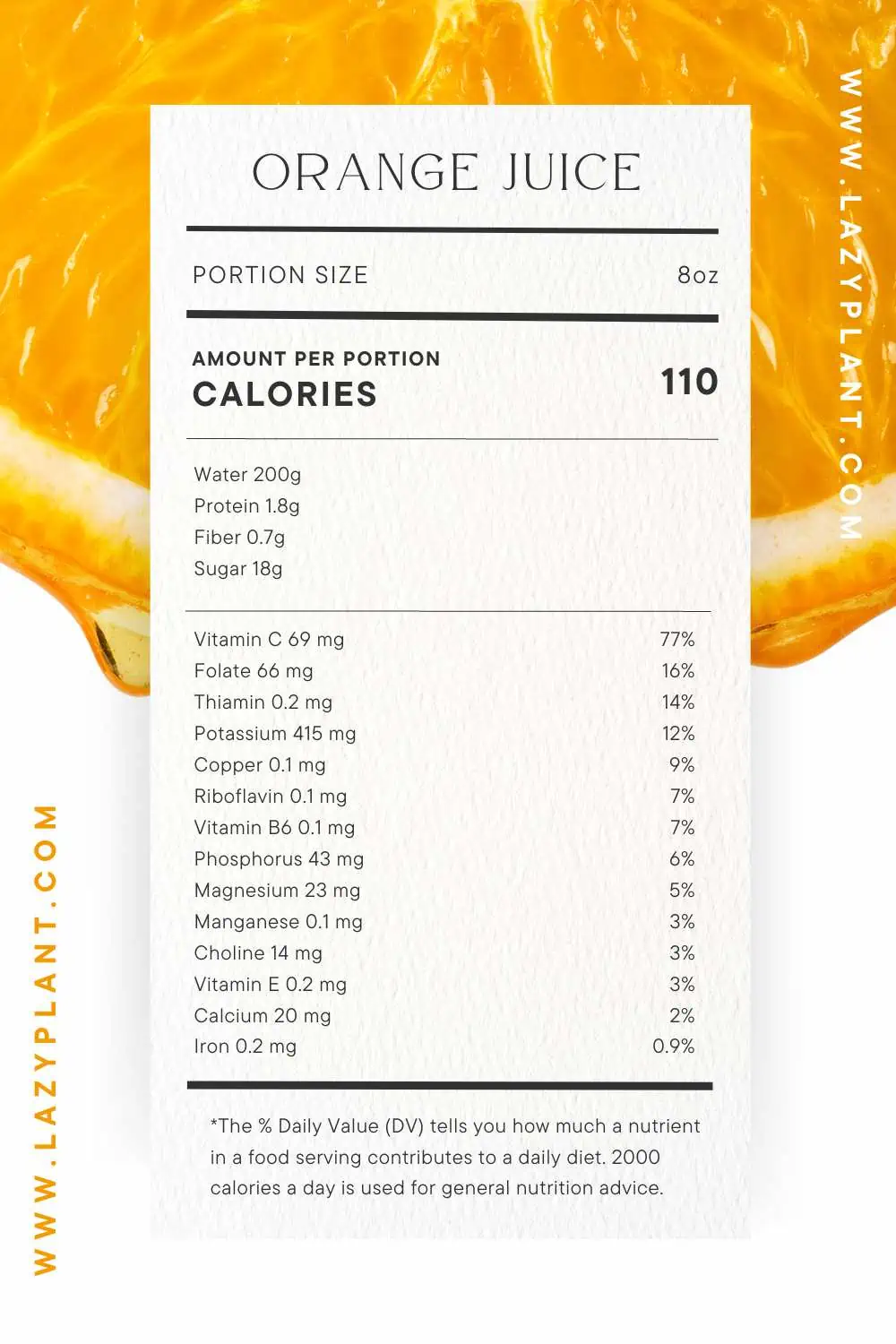Drinking orange juice, a couple of hours before bed may have beneficial effects on sleep onset latency, quality and duration. Besides vitamin C, orange juice is packed with vitamins, minerals, and antioxidants, which support a good night’s sleep and weight loss.
But, as orange juice has too much sugar, it’s preferred to use small amounts to flavor the juice of nutritious vegetables, like celery, spinach, kale, or parsley.
Does orange juice before bed help you sleep?
Orange juice is more than a great dietary source of vitamin C. It’s packed with necessary compounds for a good night’s sleep and weight loss.
Vitamin C
Above all, drinking a glass of orange juice is one of the easiest ways to boost your daily vitamin C intake. An 8 ounce glass of 100% orange juice provides about 77% of the recommended daily intake. A large 12 oz glass provides more vitamin C than the Daily Value!
It’s vital to get adequate amounts of vitamin C for a good night’s sleep. It appears to play a role in insomnia, sleep apnea, restless legs syndrome, and many more.
Also, we should have healthy concentrations of vitamin C to burn more belly fat while dieting.
Folate
Moreover, orange juice is pretty high in folate. An 8 oz glass provides 16% of the Daily Value.
A diet rich in folate seems to have a protective role in obstructive sleep apnea, due to its potent antioxidant activity.[1]
On the contrary, low levels of folate can cause insomnia or poor-quality sleep. Folate deficiency can affect the ability to fall asleep or stay asleep for a long time.
As a bonus, high folate intake from foods supports weight loss.

Thiamine
Furthermore, reasonable amounts of orange juice may have beneficial effects on sleep, as it has decent amounts of thiamine. An 8 oz glass provides 14% of the Daily Value.
Healthy thiamine levels contribute to normal sleep patterns. Low levels of thiamine have been associated with oversleeping and sleep disturbances.[2]
About 6% of the general population is deficient in thiamine, while obese people have increased risk of thiamine deficiency. Hence, it’s important to consume a wide variety of foods with thiamine.
Moreover, high thiamine intake is important for weight loss if you follow a calorie-restricted diet.
Potassium
Orange juice contributes to the daily potassium intake as well. A serving provides 12% of the DV.
Low potassium intake has been associated with poor sleep quality in the general population. Especially among women. Researchers believe that increasing potassium intake could have beneficial effects on sleep quality.[3]
You can skyrocket your daily potassium intake by following a plant-based diet.
Copper
In addition, an 8 oz glass of orange juice provides 9% of the recommended daily intake of copper.
Copper affects brain functions and regulates sleep-activity cycles.[4]
Also, as copper in involved in energy metabolism, we require high amounts for burning belly fat.
Other minerals & vitamins
Moreover, orange juice has low concentrations of many other vitamins and minerals that are vital for managing sleep patterns as well as weight loss. A serving of orange juice contains decent amounts of:
- riboflavin, 7% DV
- Vitamin B6, 7% DV
- Phosphorus, 6% DV
- Magnesium, 5% DV
- Manganese, 3% DV
- Choline, 3% DV
- Vitamin E, 3% DV
- Calcium, 2% DV
- Iron, almost 1% DV
Antioxidants
Also, orange juice is rich in certain phytonutrients like flavonoids, and carotenoids that have potent antioxidant activities.[5]
For instance, a serving of orange juice has about 60 mcg of lutein and zeaxanthin.
Antioxidants neutralize free radicals. Removal of excess free radicals before or during sleep is key for good health.
Improving the antioxidant status of the body before bedtime increases the efficiency of endogenous antioxidant mechanisms. Thus, it’s crucial to consume a wide variety of foods rich in antioxidant compounds at dinner.
Why should you avoid drinking orange juice at dinner?
Orange juice may not be the ideal late-night beverage because it’s high in sugar and has high acidity.
Sugar
An 8 oz glass of freshly squeezed, homemade orange juice has 18 grams of sugar. This is 70% of the maximum safe sugar intake.[6]
Commercial orange juice may contain even higher amounts of sugar!
According to many studies, the consumption of added sugar has a significant association to sleep quality. Too much sugar can cause short sleep or poor sleep quality.[7]
Having poor sleep is associated with increased risk of obesity! Short sleep affects your ability to control appetite! It can lead to overeating.

But, being overweight or obese increases the risk of developing sleep disorders such as obstructive sleep apnea, which may further impair sleep quality.
Moreover, sugar at dinner skyrockets postprandial glycemic levels. We should eat foods high in fiber with orange juice before bed to control postprandial glycemic responses.
Furthermore, sugar increases the risk of obesity, as it affects the reward system of the brain, altering eating behavior.
It’s vital to avoid drinking orange juice with other foods rich in net carbs at dinner. You could drink reasonable amounts of orange juice before bedtime with foods high in fiber and protein, though.
Last, but not least, you should drink orange juice at least 2 hours before going to bed. Eating or drinking right before bed can increase the risk of obesity 5-fold.
The high acidity of orange juice may disrupt sleep patterns
Orange juice is a very acidic beverage. It can have a pH lower than 4.[8]
Acid exposure at night appears to negatively affect sleep quality. It has been associated with shorter sleep duration, difficulty falling asleep, more arousals, and early awakening in the morning.[9]
Thus, you should avoid drinking orange juice right before going to bed if you have a sensitive stomach. Other common side effects may be heartburn or stomach discomfort.
You could eat foods with a high pH at dinner, though. Most vegetables, herbs, fruits, seeds, and nuts are such foods.
How to drink orange juice for better sleep?
Drinking a glass of orange juice close to bedtime may not be enough. Mixing it with other beneficial juices may have beneficial effects on sleep and weight loss.
Drink orange juice with the pulp
Fiber plays a key role in controlling postprandial glucose responses. Regular orange juice contains negligible amounts of fiber, though. So, you should prefer drinking orange juice with the pulp, as it has some fiber.
Certainly, it’s preferable to eat whole oranges before bedtime. They have substantially more fiber and less sugar.
Keep in mind that low fiber intake is associated with lighter, less restorative sleep with more arousals.[10]
Therefore, you should eat foods high in fiber at dinner. Fruit and green salads are excellent dinner ideas that boost your fiber intake.
Combine orange with other juices high in melatonin
High melatonin concentrations are beneficial for falling asleep and overall sleep quality. Also, melatonin supports weight loss.
Among the richest foods in melatonin are cranberries, tart cherries, strawberries, and grapes. So, you could drink a mix of orange juice with the juice from any of these fruits.
Cranberry juice has the highest melatonin concentration, though. Hence, reasonable amounts of cranberry juice close to bedtime are particularly beneficial for a good night’s sleep.
Benefits of drinking orange juice with foods rich in carotenoids at dinner
A high carotenoid intake appears to improve overall sleep quality.[11]
The easiest way to boost your daily carotenoid intake is by mixing carrot and orange juice. Carrots are among the richest foods in carotenoids.

Spinach, turnip, dandelion, collard, beet, and chicory greens are also packed with carotenoids. You could incorporate them in many dinner recipes.
However, the easiest way to take advantage of their high carotenoid content is by using a slow, cold press juice extractor. You can mix nutritious green juices with orange juice for flavor.
You can find a wide variety of juicers on Amazon.
Why should I mix orange with beetroot juice?
Moreover, you could mix beetroot with orange juice for better sleep.
Beetroot juice is one of the richest foods in nitric oxide. This compound seems to regulate sleep-wake cycles.[12]
Other foods naturally high in nitric oxide are arugula, celery, spinach, lettuce, and cress.
Nitric oxide protects the cardiovascular system and promotes athletic performance, as it helps the body transfer more oxygen to the muscles.
You can flavor orange juice with herbs & spices
Herbs and spices are the richest foods in antioxidants. They can fight oxidative stress with only a few extra calories. You could try drinking orange juice with a dash of ginger, coriander, mint, cinnamon etc.
Foods with tryptophan
Last, but not least, you should drink orange juice as part of a well-balanced diet.
If you prefer drinking orange juice at dinner, at least avoid consuming other foods high in sugar.
You should eat foods rich in tryptophan, though. Tryptophan is a key amino acid for a good night’s sleep. Tryptophan is a precursor to the neurotransmitter serotonin, and the hormone melatonin. Both key compounds for sleep.[13]
Among the richest foods in tryptophan that can eaten close to bedtime are eggs, Parmesan cheese, chia seeds, sesame seeds, salmon, tuna, turkey, oats, and many more.
Hence, great late-night snacks are tuna sandwich or tuna salad, omelet, yogurt with seeds, or cheese and oats crackers.
Recipes with orange juice for a good night’s sleep & weight loss.
Spice up orange juice with these 20 easy and quick recipes.
- Ginger Twist: Add 1 teaspoon of freshly grated ginger to your orange juice and stir well.
- Minty Citrus: Infuse your orange juice with a handful of fresh mint leaves and a squeeze of lime.
- Orange Spice Delight: Mix in 1/2 teaspoon of ground cinnamon and a pinch of nutmeg to your orange juice.
- Tropical Zest: Combine orange juice with 1/4 cup of pineapple juice and a sprinkle of grated coconut.
- Ginger Mint Refresher: Blend orange juice with a handful of fresh mint leaves and a teaspoon of grated ginger.
- Cranberry Orange Fusion: Mix equal parts of orange juice and cranberry juice for boosting melatonin intake.
- Citrus Beet Boost: Blend orange juice with 1/4 cup of beetroot juice for a vibrant and nutritious beverage that protects the heart.
- Spiced Carrot Citrus: Combine equal parts of orange juice and carrot juice with a dash of ground cinnamon.
- Citrus-Berry Bliss: Mix orange juice with a splash of strawberry juice and cranberry juice.
- Citrus Cherry Burst: Blend orange juice with a handful of pitted cherries for a burst of sweet-tart flavor.

- Green Citrus Elixir: Combine orange juice with a splash of your favorite green juice, such as kale or spinach.
- Gingered Pear Delight: Mix in 1/2 teaspoon of grated ginger and 1/4 cup of pear juice to your orange juice.
- Minty Watermelon Twist: Blend orange juice with a handful of fresh mint leaves and a splash of watermelon juice.
- Citrus-Pineapple Medley: Combine orange juice with equal parts of pineapple juice and a squeeze of lime.
- Cherry-Beet Citrus Refresher: Mix equal parts of orange juice, cherry juice, and beetroot juice for a vibrant drink.
- Apple Cinnamon Burst: Add a splash of apple juice and a sprinkle of ground cinnamon to your orange juice.
- Citrus-Parsley Refresher: Blend orange juice with a handful of fresh parsley leaves for a refreshing twist.
- Citrus-Mango Tango: Mix orange juice with equal parts of mango juice.
- Spiced Berry Blast: Combine orange juice with a dash of ground cloves, 1/4 cup of strawberry, and 1/4 cup of cranberry juice.
- Citrus Kiwi Surprise: Blend orange juice with a splash of kiwi juice and a squeeze of lemon.
How much orange juice should I drink before bed?
It’s crucial to avoid consuming high amounts of orange juice close to bedtime. Its high sugar content and its high acidity may negatively affect sleep onset latency and overall sleep.
As a rule of thumb, you should drink up to 8 oz of orange juice before bed. Less is better.
Orange juice supports a good night’s sleep and weight loss when small amounts are mixed with nutrient-dense vegetable juices. Sugars of orange juice add flavor to tangy green juices.
Green juices are ideal for weight loss and support sleep. They’re low in sugars, while they’re among the most nutritious foods you can consume. For instance, they’re the best dietary sources of chlorophyll. Chlorophyll fights oxidative stress and has powerful anti-aging properties.
Whole orange or orange juice before bed?
Certainly, whole oranges are a better dinner choice as compared to orange juice. They have less sugar and fewer calories.
Should I drink fortified orange juice before bed for improved sleep quality?
Fortified orange juices are usually packed with calcium. An 8 oz bottle usually provides up to 35% of the Daily Value of calcium.
Adequate calcium intake is necessary for a good night’s sleep. It regulates slow-wave sleep generation.[14]
However, you don’t have to consume fortified orange juices if you follow a well-balanced diet.
Cow’s milk, yogurt, and cheese aren’t the only dietary sources of calcium. There are many plant-based foods containing decent amounts as well. For instance, tahini is the richest vegan food in calcium. Just a tablespoon helps meet our daily needs.
What’s the best time of the day to drink a glass of orange juice?
Actually, the best time to drink orange juice is in the morning. Sugar is stored as muscle glycogen, while antioxidants protect the eyes and skin from oxidative stress due to air pollution or sun radiation.
What’s the best beverage for dinner?
At dinner, we could also drink a glass of warm milk or a cup of chamomile tea. These are great beverages for a good night’s sleep.